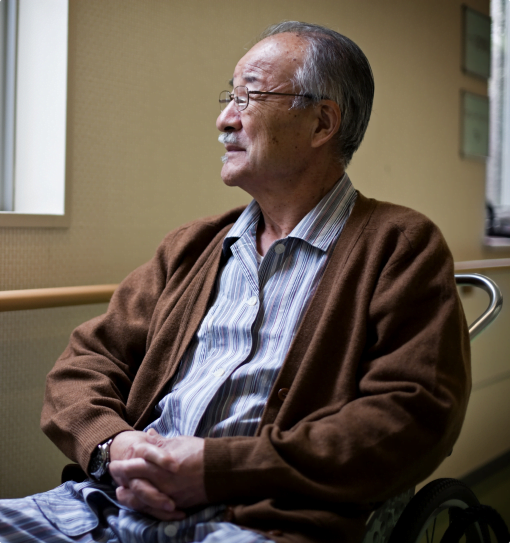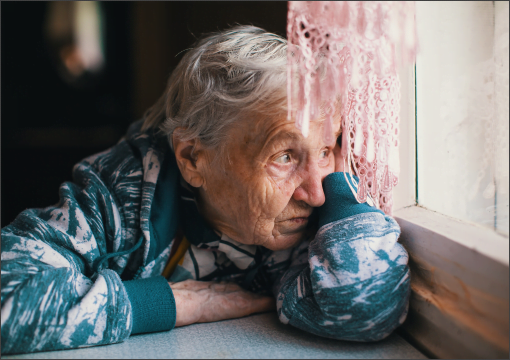Elderly Nursing Home Abuse Lawyers
Elderly abuse, a profoundly concerning and prevalent issue, is the deliberate or negligent infliction of harm or distress upon an older individual, typically aged 60 and above. This mistreatment can take various forms, from physical and emotional harm to financial exploitation and neglect.

A nursing home abuse attorney can help you file a claim
With the growing aging population, it is crucial to address and combat elderly nursing home abuse and safeguard older adults’ well-being and dignity. Oracle Law Firm | Accident & Injury Attorneys plays a vital role in this fight, utilizing our expertise and dedication to uphold justice for victims of elderly nursing home abuse here.

Types of elderly abuse
Physical Abuse
This abuse involves intentionally using force against an elderly individual, resulting in physical pain, injury, physical harm, or impairment. It can manifest in various ways, such as hitting, slapping, pushing, or restraining the elderly person by physical or chemical means.
Emotional or Psychological Abuse
Emotional or psychological abuse occurs when an individual inflicts distress or mental pain on an elderly person through verbal or non-verbal actions. This can include humiliation, intimidation, threats, isolation, or manipulation, which may lead to anxiety, depression, and a decline in the elderly person’s overall mental health.
Financial exploitation
Financial exploitation is the illegal or improper use of an elderly individual’s funds, property, or resources. This can involve misusing or stealing an elderly person’s money or possessions, forging their signature, or deceiving them into signing documents that relinquish their financial control.
Neglect or abandonment
Neglect refers to the failure of a family member or a caregiver to fulfill their obligations in providing essential care to an elderly person. In contrast, abandonment is deserting an elderly individual needing care. This can lead to malnutrition, dehydration, inadequate hygiene, and other health risks for the elderly.
Sexual assault
Sexual abuse involves non-consensual sexual contact or activity with an elderly individual. This form of abuse may involve physical force, threats, or manipulation, resulting in significant emotional and psychological trauma for the victim.
Self-neglect
Self-neglect is a unique form of elderly abuse, as it refers to an elderly person’s inability or unwillingness to provide themselves with the necessary care. This can result from cognitive decline, depression, or physical limitations and may lead to serious mental health problems or issues or a decline in overall well-being.
Risk Factors and Warning Signs
Understanding the factors contributing to elderly nursing home abuse cases and recognizing the warning signs can help in the early detection and prevention of nursing home abuse cases. It is essential to be vigilant, report nursing home abuse, and take appropriate action when faced with potential cases of elderly nursing home abuse case.
Factors Contributing to Elderly Abuse & Nursing Home Neglect
Social isolation
Elderly individuals who are socially isolated, with limited contact with friends or family, are more susceptible to abuse. This isolation may make it difficult for them to seek help or confide in someone about their situation.
Mental or physical impairment
Older adults with cognitive or physical impairments, such as dementia or mobility limitations, may be more vulnerable to abuse, as they may have difficulty recognizing, understanding, or reporting the abuse.
Financial dependency
Financial dependency on caregivers or family members can create a power imbalance, increasing the risk of financial exploitation or other forms of abuse.
Substance abuse
Substance abuse by either the elderly person or their caregiver can increase the likelihood of abuse, as it may impair judgment, exacerbate existing issues, or contribute to caregiver stress.
Caregiver stress
Caregivers who are overwhelmed by their responsibilities, lack the necessary support, or suffer from mental health issues may be more likely to resort to abusive behavior.
Common Warning Signs
Physical indicators
Unexplained or severe injuries, such as bruises, welts, or burns, can signify physical abuse. Other indicators may include frequent injuries, unexplained pain, or a reluctance to seek medical attention.
Emotional or behavioral changes
Sudden changes in mood or behavior, such as increased agitation, withdrawal, or fear, may indicate emotional or psychological abuse. The elderly person may also exhibit signs of depression or anxiety.
Financial irregularities
Unusual financial activity, such as unauthorized withdrawals, changes in spending habits, or missing possessions, can signify financial exploitation.
Neglect-related signs
Indicators of neglect or abandonment may include poor hygiene, untreated medical conditions, weight loss, or an unsafe living environment. Observing these signs should prompt further investigation to ensure the well-being of the elderly individual.
Legal rights and protections for the elderly
A robust legal framework exists at both federal and state levels to protect the rights of elderly individuals and address cases of abuse or neglect. Understanding these laws and regulations is important to ensure that elderly individuals receive the protection and justice they deserve.
Federal laws and regulations
Older Americans Act (OAA): The OAA, enacted in 1965, promotes the well-being of older individuals by providing services and support to help them maintain their independence and dignity. This includes funding for elder abuse prevention programs, legal assistance, and in-home services.
Elder Justice Act: Passed as part of the Affordable Care Act in 2010, the Elder Justice Act aims to prevent, detect, and prosecute elder abuse. It establishes the Elder Justice Coordinating Council and funds Adult Protective Services and other programs to combat elder abuse.
Nursing Home Reform Act: The Nursing Home Reform Act, part of the Omnibus Budget Reconciliation Act of 1987, sets standards for skilled and nursing homes, facilities, and home care and establishes a nursing home Resident”s Bill of Rights to protect elderly individuals residing as nursing home residents in long-term care facilities.
State-specific laws and regulations in California
Elder Abuse and Dependent Adult Civil Protection Act (EADACPA): California’s EADACPA provides legal protection to elderly individuals and dependent adults who are victims of abuse or neglect. It includes provisions for civil remedies, injunctive relief, and attorney’s fees. The EADACPA expands the definition of abuse to include physical, emotional, and financial abuse, neglect, abandonment, and isolation. For more information on the EADACPA, please visit the California Legislative Information website.
Adult Protective Services (APS): California’s APS investigates reports of elder abuse, neglect, or exploitation and provides necessary protective services, support, and resources to elderly individuals who are at risk or have been victimized.
Mandatory Reporting Requirements: In California, certain professionals, such as healthcare providers, social workers, and law enforcement officers, must report suspected elder abuse or neglect to the appropriate authorities. Failure to do so can result in penalties, including fines and imprisonment.
Statutes on Criminal Prosecution: California has specific laws criminalizing elder abuse of nursing home residents, as outlined in the Penal Code Section 368. Perpetrators of nursing home abuse may face charges such as physical abuse, emotional or mental abuse, neglect, or financial exploitation, depending on the nature of the abuse. Penalties for these offenses can include imprisonment, fines, and restitution orders.
By focusing on California-specific laws and regulations, Oracle Law Firm | Accident & Injury Attorneys is well-equipped to address elder abuse cases and help victims seek legal justice and protection. Reach out to us for a free consultation.

Legal remedies for victims
Civil lawsuits
Victims of elder abuse or their families may pursue civil lawsuits against the perpetrator or responsible parties, such as a nursing home facility or a nursing home resident, employee, or caregiver, to file a lawsuit to hold them accountable and seek damages for their suffering.
Criminal prosecution
In cases where the abuse constitutes a criminal offense, federal and state laws may prosecute the abuser, potentially resulting in imprisonment, fines, or other penalties.
Restitution or compensation
Courts may order the perpetrator to provide restitution or compensation to the victim, covering costs such as medical treatment or expenses, stolen property, or pain and suffering resulting from the abuse.
Role of Oracle Law Firm | Accident & Injury Attorneys in Addressing Elderly Abuse
Oracle Law Firm | Accident & Injury Attorneys is committed to assisting victims of elderly abuse and their families in obtaining justice, protection, and compensation for their suffering.
Our experienced team of attorneys is dedicated to providing comprehensive legal services in the fight against elderly abuse, ensuring that our client’s needs are met and their rights upheld.
Client representation
Victim advocacy
Oracle Law Firm | Accident & Injury Attorneys advocates for the rights and well-being of elderly abuse victims, providing compassionate support and guidance throughout the legal process. We work tirelessly to ensure that our clients’ voices are heard, their needs addressed, and justice is served.
Civil litigation
Our attorneys have extensive experience representing clients in civil litigation related to elderly abuse cases in nursing home facilities. We are skilled in holding perpetrators and responsible parties in nursing homes accountable for their actions, seeking compensation for medical expenses, pain and suffering, and other damages resulting from nursing home negligence for abuse victims.
Legal Advice and Consultation
Understanding Rights and Protections
Oracle Law Firm | Accident & Injury Attorneys provides expert advice and consultation to help clients understand their legal rights and protections against any nursing home neglect and abuse under federal and California state laws.
We are well-versed in nursing home abuse lawsuits and the complexities of elder abuse laws. We are dedicated to educating our clients about their rights in nursing home elder abuse litigation and the legal remedies available to them.
Navigating Complex Legal Systems
The legal system can be overwhelming and confusing, particularly for elderly individuals or their families already dealing with the emotional impact of their nursing home neglect and abuse cases. Our attorneys are adept at navigating the complexities of the legal system and guiding clients through the necessary steps to achieve a favorable outcome.
Identifying Legal Options and Remedies
At Oracle Law Firm | Accident & Injury Attorneys, we work closely with our clients to identify the most appropriate legal options and remedies for their specific situations, whether pursuing a civil lawsuit, seeking criminal prosecution, or exploring alternative forms of resolution. Our ultimate goal is to protect our client’s rights and interests while helping them achieve justice and closure.
By entrusting Oracle Law Firm | Accident & Injury Attorneys with your elderly abuse case, you can be confident that our skilled and compassionate team will work diligently to protect your rights, uphold justice, and provide the support you need during this challenging time. Reach out to us for a free case review.
Let a California Nursing Home Abuse Attorneys from Oracle Law Firm | Accident & Injury Attorneys Help You Understand the Laws in California
Preventing elderly abuse requires collective action from individuals, communities, and organizations. Oracle Law Firm | Accident & Injury Attorneys is deeply committed to protecting the rights and well-being of elderly individuals by representing victims in legal proceedings. If you or a loved one has been a victim of elderly abuse, we encourage you to seek legal help and take the necessary steps to hold the perpetrators accountable. Together, we can make a difference in the lives of vulnerable seniors and help create a safer, more compassionate society for all.
Frequently Asked Questions

What is nursing home abuse?
Nursing home abuse refers to the physical, emotional, sexual, or financial mistreatment of elderly individuals who reside in nursing homes, assisted living facilities, or other care facilities.
How do I know if my loved one is a victim of nursing home abuse?
Common signs of abuse include unexplained injuries, sudden changes in mood or behavior, malnutrition, dehydration, unsanitary living conditions, and reluctance to communicate with staff or visitors.
What should I do if I suspect abuse?
If you suspect abuse, report your concerns to the nursing home management and contact local authorities. It’s also crucial to consult an experienced nursing home abuse attorney to discuss your options for seeking justice and financial compensation for the victim.
What can nursing home abuse lawyers do for victims and their families?
Nursing home abuse lawyers can help victims and their families understand their legal rights, investigate the abuse, gather evidence, and represent them in negotiations or court proceedings. They can also help secure financial compensation for medical bills, pain and suffering, and other damages.
What is a nursing home abuse lawsuit?
A nursing home abuse lawsuit is a legal action taken by a victim or their family against a nursing home or its staff for abuse or neglect. The goal is to hold the responsible parties accountable and obtain financial compensation for the harm caused.
Can I file a lawsuit for abuse that occurred in an assisted living facility?
Yes, abuse in assisted living facilities is just as severe as in nursing homes, and victims or their families can file lawsuits to seek justice and compensation.
How do personal injury lawyers handle nursing home abuse cases?
Personal injury lawyers who specialize in nursing home abuse cases work to gather evidence, build a strong case, and negotiate or litigate on behalf of the victim or their family to obtain the best possible outcome.
Can I sue for wrongful death in a nursing home abuse case?
You may have grounds for a wrongful death lawsuit if a loved one died due to nursing home abuse or neglect. An elder abuse attorney can help determine if you have a valid case.
What is medical malpractice in the context of nursing home abuse?
Medical malpractice occurs when a healthcare provider, such as a doctor or nurse, fails to provide the appropriate standard of care, harming the patient. In nursing home abuse cases, this may involve the improper administration of medication, failure to treat injuries, or neglect to provide necessary medical care.
How do I obtain medical records to support a nursing home abuse case?
Your nursing home abuse attorney can help you obtain relevant medical records through legal channels, such as issuing subpoenas or requesting documents from the facility.
What financial compensation can be awarded in nursing home abuse cases?
Compensation in nursing home abuse cases can include medical expenses, pain and suffering, emotional distress, loss of companionship, and in some cases, punitive damages. The specific amount awarded will depend on the circumstances of the case.
How do I find an experienced nursing home abuse attorney?
To find an experienced nursing home abuse attorney, research online, ask for recommendations from friends or family members or contact your local bar association for referrals. Look for an attorney with a proven track record in nursing home abuse cases and a deep understanding of the relevant laws and regulations.

Contact Oracle Law Firm | Accident & Injury Attorneys for a free consultation
To schedule your free and confidential case review call us at 888-597-4099 or fill out the form below.
Below are some essential resources and hotlines for reporting elder abuse and seeking assistance:
National Center on Elder Abuse (NCEA)
National Elder Abuse Hotline
The National Elder Abuse Hotline, operated by the Administration for Community Living, provides a 24/7 helpline for reporting elder abuse and seeking assistance. You can reach the hotline by calling 1-800-677-1116.
Adult Protective Services (APS) in California
California’s APS investigates reports of elder abuse, neglect, or exploitation and provides necessary protective services, support, and resources to elderly individuals who are at risk or have been victimized. To find the contact information for your local APS office, visit the California Department of Social Services website at https://www.cdss.ca.gov/adult-protective-services.
California Department of Aging (CDA)
The CDA offers resources, information, and support for older adults, their families, and caregivers in California. You can find more information on their website at https://www.aging.ca.gov/.
Awards & Recognitions










